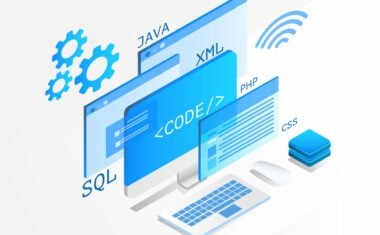Programming is the kind of job that allows you a great deal of flexibility. Only a small percentage of programmers report full-time to an office and given that programmers are needed in virtually every industry, programmers can always find work that aligns with their own interests.
One of the ways you can gain even more freedom as a programmer is by going the freelance programming route. Most programmers tend to view freelance work with some apprehension, and understandably so. Going freelance means leaving the familiar safety of a full-time role and sacrificing this for the freedom of working for yourself.
If you’ve ever thought about going the freelance programmer route, but aren’t sure how to find the right projects or market your skills, then you’re in the right place. In this article, we’ll answer all the questions you have about freelance developers and show you how you can create a career in this space.
What Does a Freelance Programmer Do?
Freelance programmers are software developers who don’t work for any one company. Rather, they’re hired on a project or contract basis and engage with an organization only for that duration.
There are advantages and disadvantages that come with working as a freelance developer. Freedom is an obvious advantage, as you get to decide who you want to work with and what kind of projects you want to work on as a freelance developer. There’s also the freedom of working from wherever you want and structuring your work however you want.
There are challenges that come with choosing the freelance lifestyle. When you become a freelancer, you essentially start running a one-person business. That means that all of the responsibility of finding a client base, marketing your professional skills, and doing housekeeping work like tracking business expenses falls on you. You have to be mentally prepared to do all of these accessory tasks if you want to become a successful freelance programmer.
How To Become a Freelance Programmer: A Nine-Step Guide
A career in freelance software development comes with a lot of perks that aren’t available to full-time employees. For that reason, lots of programming professionals become curious about how they can become self-employed. Here’s a roadmap that you can follow to establish a career in freelance programming.
-
Make a Concrete Plan
-
Determine Your…
-
Develop Your Online Presence
-
Establish Your Freelance Business
-
Identify Your Lead Generation Sources and Land Your First Client
-
Keep Prospecting (and Keep Your Clients Happy)
-
Join the Freelance Programming Community
-
Expand Your Skillset and Never Stop Learning
-
Grow Your Business
Make a Concrete Plan
There is some preliminary work that needs to be done before you start racking up projects as a freelance developer. Here are a few things that you should consider early on.
Do Your Research To Ensure That Freelancing Is Right for You
It’s common for programmers to want to make a quick switch to freelancing when they hear about the freedom and flexibility that come with freelancing. While it is true that those things are on offer, you should do some in-depth research to make sure that you have the gumption to work as a freelancer.
You can start your research online. Try to read first-hand accounts by actual freelance programmers as much as possible. In a similar vein, it’s helpful to interact with freelance coders. This becomes easy if you know people in your network who work in such a capacity. If that’s not the case, you can look up freelance programmers on professional networking sites like LinkedIn.
When doing cold outreach to programmers you want to talk to, remember to always send a concise message on what your ask is. For example, you might request a 15-minute call where you can discuss specific aspects of working as a freelancer. Make sure you prepare for the interaction and have a list of questions ready for it.
Create a Flexible Roadmap for Your Freelance Programming Journey
Having a concrete timeline creates a sense of direction and accountability. This is useful because it’s easy to lose steam as you prepare for a career in freelancing. So creating milestones and deadlines is a good way to visualize your progress.
The specific form your roadmap takes will depend on your personal journey. You need to take stock of how much time it will take you to do the things laid out in this guide, such as setting up your online presence, registering your business, and generating leads.
What’s important is that you have measurable goals for each stage of your journey. Give yourself deadlines for each stage and track your progress. This will ensure that you’re making tangible progress and don’t get lost in the rigmarole.
Have an Emergency Fund
You should be prepared to spend some time making less than what you normally make when you’re just starting out as a freelancer, so it helps to have an emergency fund to tide you over.
Your fund should serve your basic needs for a few months. Take things like rent, food, and other basic living expenses into account. Also, ensure that you account for tools that you require for work. So if you need a new laptop or router, those things should be covered by your emergency fund.
Determine Your…
There are a few things that you need to reflect on and decide before you start your freelancing career. Let’s take a look at what they are.
Specialization
Freelance programmer is something of a catch-all term that you can’t actually use once you have to start looking for freelance projects. You need to come up with something a lot more specific than that so that potential clients know what you’re offering.
You can come up with your specialization based on your programming skills. That includes the programming languages that you know, your technical skills, and the kind of tools that you’re familiar with.
So if you’re someone who knows how to work with Swift and have built apps for the iOS environment, then you can market yourself as a Swift or iOS programming specialist. This tells your clients exactly what programming languages you know and what your skills are.
Offerings
At this point, you should have a sense of what your specialization is. But that still doesn’t tell potential clients how you offer your professional services to them. So now you need to structure your specific offering to clients.
Let’s say that you’re a front-end developer. You can’t just tell clients that you develop the front end for websites—you need to be more specific than that. So you would come up with specific offerings, such as doing user research, producing wireframes, and coding the front-end.
For each of those stages, you would also come up with a timeline and specify how many revisions you offer at each stage. Creating an offering in this way not only clarifies your programming services but also displays professionalism and shows clients that you know what you’re talking about.
Prices
Finally, you need to come up with a pricing structure for your offering. This part requires some research. You need to figure out what market rates are like for each of your offerings. It helps to talk to freelancers in your industry to determine how they price their services.
It’s important to remember that your hourly rate should also take into account some of the unpaid work that you will do as a freelancer. You’re going to end up spending a lot of time writing emails and getting on calls with clients. Make sure that you take that time into account when determining your pricing structure.
Develop Your Online Presence
As noted earlier, you’re essentially running a one-person business if you’re a freelance programmer. And like any other business, you need to have an online presence where you can market your professional skills and create a pipeline of freelance opportunities. Let’s take a look at how you can get that done.
Build a Strong Portfolio
You need to have an online portfolio where clients can see all of the projects that you’ve worked on. A personal website goes a long way in this regard. It allows you to present your past work exactly how you want to.
When creating your online portfolio, make sure that each project is presented separately and with concise information. Readers should be able to quickly glean information on project goals, coding languages used, and end results.
Optimize Your LinkedIn Profile
LinkedIn is the largest professional network in the world and gives you unmatched reach. So make sure that your LinkedIn is updated and that it’s clear that you’re a freelance programmer offering your services to clients.
Build a GitHub Profile
A Github profile can also serve as a useful part of your online portfolio, as it allows you to display all of the various open-source projects and other kinds of work that you’ve done. Clients with a more technical bent will often use Github to look at how programmers structure their codebases and use that to determine whether they’re suitable for a specific project.
Establish Your Freelance Business
A freelance business is, well, a business. So there are a few non-coding things to be done along with your core work as a programmer. Here are a few things that you need to take care of:
Register Your Business Appropriately
You don’t necessarily need to register a business in order to work as a freelance programmer. It is possible to engage with a business as an individual and pay your taxes as usual. That said, it is advisable that you set up a business because of the tax benefits and limited liability involved.
A sole proprietorship is the simplest business structure to choose if you’re just getting started out. You could also set up an LLC at a point when your business begins to do significant numbers. Make sure to reach out to a lawyer or accountant in your area to find out about local laws and registration processes.
Find the Right Working Environment
Not enough freelancers spend time thinking about their work environment, which is important because the way you set up your workspace will often determine your productivity.
You should try out a few different kinds of working environments before deciding which one works best for you. That means that you can try working from different spaces in your home, at a coworking space, at coffee shops, and any other spaces that you think you might be able to work out of.
Give each space a chance before picking one. That means that you spend a significant amount of time working in each environment. Notice how productive you feel and what your actual work rate is like. Only once you’ve done these things should you decide that you should work out of a specific space.
Organize Your Tech Stack and Documents (Contracts, Invoicing, etc.)
Any successful freelance programmer will tell you that you need to have a strong grasp of your own tech stack before getting started. You should have your development and production environment set up, decide how you want to do testing and determine how clients will be able to interact with any prototypes.
Another important piece of housekeeping is your paperwork. You should have a standard contract in place that you send clients at the beginning of each engagement. Have an attorney structure this document for you.
You should also have a standard invoice structure in place. An important part of invoicing for freelancers is using a time-tracking tool if that’s how you price your services.
Get Insurance
One of the most overlooked aspects of going freelance is losing the various insurances that were previously provided to you by your employer. It’s now on you to get your own health insurance, life insurance, and liability insurance to protect you from legal action.
There are now various organizations that cater to the insurance needs of freelancers. Freelancers Union provides a bouquet of offerings in this department. In the USA, the Affordable Care Act and Consolidated Omnibus Budget Reconciliation Act (COBRA) are legal provisions that can be used to gain insurance as a self-employed individual.
Identify Your Lead Generation Sources and Land Your First Client
Now for the exciting part—it’s time to actually start getting clients and providing your services as a freelancer. Here are a few avenues where you can get that done.
Freelance Platforms
There are various online platforms where you can find freelance projects. These include:
You can set up profiles on these websites to gain access to freelance programming opportunities.
Ask Your Network
It’s very possible that your first few freelance jobs will come through your network. Don’t be embarrassed to let your friends and family know that you’ve taken the freelance route. You will often find that someone is able to refer you to a freelance job or get you in touch with decision-makers at companies that engage freelancers.
Job Boards
Most regular job boards today have a category dedicated to freelancers. So make sure that you look at job listings on websites like LinkedIn, GlassDoor, ZipRecruiter, and other such platforms. And don’t forget to keep your profile on these job sites updated because that’s how recruiters identify and reach out to talent.
Online Coding Communities
Online coding communities are a great way to be in touch with others who are passionate about programming. Along the way, you will get access to jobs and be able to pick up tricks of the trade from others who have decided to go the freelance way.
Here are a few sites where you should consider joining the programming communities:
Keep Prospecting (and Keep Your Clients Happy)
You will find that you spend a lot of time interacting with clients or looking for new ones. Don’t let this feel like it’s a distraction from your main job as a programmer—this is some of the most important work you’ll do as a freelancer.
Working on your sales skills as a whole can really widen the range of opportunities you get access to. Over time, you should be able to prospect in a methodical manner and set up a pipeline of new clients whenever required.
Join the Freelance Programming Community
We’ve already taken a look at some online freelance communities that you should engage with. It’s also important that you become a part of the freelance community in your local area. Websites like Meetup.com are a great way to meet other freelancers and exchange notes on your work.
Expand Your Skillset and Never Stop Learning
You should, of course, keep working on enhancing your technical skills if you want to be good at your job as a freelance programmer. You’ll open yourself to a wide range of new kinds of work if you do that.
An aspect of their skillset that freelancers often overlook is soft skills. Since you run your own business now, you need to have strong communication skills so that you can get new clients and keep existing ones happy.
Grow Your Business
Expanding and optimizing your business is a process that never stops. You should always have an eye on gaining new clients and coming up with ways to make your own life easier as your business grows. You could do this in several ways, including hiring people to help you when required, paying for tools to support your work, and trying to land higher-paying clients.
Get To Know Other Software Engineering Students
Jack Mayer
Software Engineer at Whitepages
Elena Nurullina
Junior Web Developer at G/O Media
Rafael Alvarado
IT Support Engineer at Amazon
How Much Can You Make as a Freelance Programmer?
The average salary of a freelance programmer is almost $86,000 per year. Professionals in the 75th percentile make $108,500.

Becoming a Freelance Programmer: Real-Life Examples To Inspire You
Here are a couple of people you can use as inspiration in your journey as a freelancer.
PortEXE
In the linked piece, PortEXE details their journey of going from a self-taught web developer to creating a successful career as a full-stack developer. The video contains invaluable information on how you can use websites like Codecademy to sharpen your skills. They also go over how you can use websites like Reddit to interact with fellow freelancers and meet new clients.
Timothy Mugayi

Timothy Mugayi goes over some of the hard, lesser-known truths of working as a freelance programmer. These are things that you should be aware of before deciding to move into such a role. He covers things like how to navigate freelance job sites and how your geography can determine the kind of roles you get access to.
FAQs About Becoming a Freelance Programmer
We’ve got the answers to your most frequently asked questions.
Are Freelance Programmers in Demand?
Yes, freelance programmers are in demand. Programming skills like web development and data analytics made LinkedIn’s list of the most in-demand freelance skills in 2022.
How Much Should I Charge for Freelance Programming?
There is no one-size-fits-all answer to this question. You should come up with your rates based on what you think your hourly value is and by talking to other freelancers in your field.
What Is the Highest-Paying Freelance Coding Language?
According to a report by Upwork, Objective C and Goland are among the highest-paying languages.
How Much Can You Make as a Python Freelancer?
Python developers charge between $31 and $78 for an hour of work. The average pay of a Python freelancer appears to be about $50 per hour. Income can vary depending on your location and experience.
How Many Hours a Week Do Freelance Programmers Work?
You are free to decide how many hours of work you want to do weekly as a freelance programmer. As much as possible, try to keep that number at about 40 hours of work each week so that you can maintain a healthy work-life balance.
Since you’re here…
Were you one of the tens of thousands of workers impacted by this year’s tech layoffs? Springboard wants to help. Our new Career Reboot Scholarship is intended to assist job seekers from tech looking to upskill, reskill and stand out in a competitive hiring environment. Get $1,000 off any Springboard bootcamp in software engineering, data analytics, UX design, cybersecurity, tech sales, and more. Visit this page for eligibility requirements and to apply.







